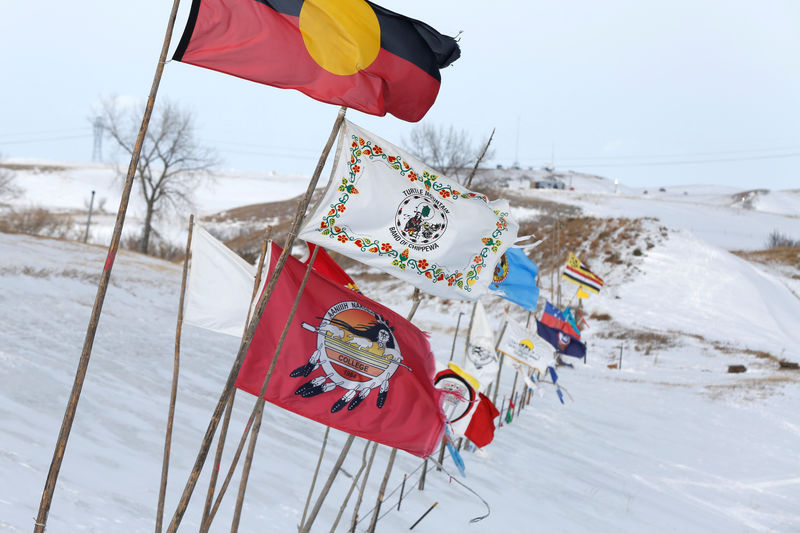By Timothy Mclaughlin and Terray Sylvester
Feb 21 (Reuters) - Protesters near the site of the Dakota Access pipeline are bracing for a stand-off with law enforcement as they face orders to evacuate a camp that has served as the base of their opposition to the multibillion-dollar project.
Native Americans and environmental activists have lived at the Oceti Sakowin camp in North Dakota for months, fighting the construction of the pipeline that they say threatens the water resources of the Standing Rock Sioux tribe and sacred land.
North Dakota Governor Doug Burgum and the U.S. Army Corps of Engineers have set a Wednesday afternoon deadline for protesters to clear out of the camp in Cannon Ball, North Dakota, which is on Army Corps land.
However, some protesters intend to remain, forcing a potential showdown that could end in arrests of many protesters, law enforcement and camp leaders said on Tuesday.
"A lot of them are going to stay and they're not going to give up, no matter what army they bring in to make people back off," Lewis Grassrope, a leader at the camp, said in a telephone interview.
Law enforcement officials on Tuesday were planning how to handle Wednesday's evacuation deadline of 2 p.m. local time, said Maxine Herr, a spokeswoman for the Morton County Sheriff's Department.
"There are certainly those that are planning to stay," Herr said. "As much as they are tearing down, they are building."
The protest garnered support from Hollywood celebrities and U.S. military veterans, with thousands traveling to the camp last year to protest the pipeline being built by Energy Transfer Partners LP ETP.N . Energy Transfer Partners spokeswoman did not respond to a request for comment.
The mood in the camp was jubilant in December when the Army Corps ruled against an easement to drill under Lake Oahe, the final link in the 1,172-mile (1,885-km) project. The Standing Rock Sioux subsequently asked protesters to disperse, but some remained.
However, President Donald Trump, just days after taking office, signed an executive order clearing the way for the pipeline to proceed. judge denied a request earlier this month by two tribes seeking to halt construction, which resumed. The tribes are seeking an injunction to order the Army Corps to withdraw the easement. Tuesday, leaders said around 300 protesters remained at the camp, now sodden from rain and melting snow.
Governor Burgum, a Republican, has said floods pose a safety threat and trash at the camp could pollute the Missouri River, but demonstrators say that fear is overhyped. the setbacks, Melaine Stoneman, a camp leader, said protesters were not dismayed.
"The fight continues on as it has for over 500 some years of them trying to exterminate and eliminate us (Native Americans)," she said.
